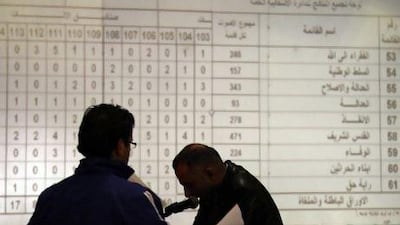AMMAN // A combination of pro-government tribal leaders and businessmen looks set to dominate Jordan's next parliament again, after more than 1.2 million voters turned out in what supporters of King Abdullah II acclaimed as an endorsement of his policy of measured political reform.
Three-dozen Islamists and government critics, standing as independents, won election to the 150-seat lower house of parliament, according to official figures released yesterday.
But the voter turnout of just more than 56 per cent was portrayed by the king's loyalists as a repudiation of Jordan's main Islamist party, the Muslim Brotherhood, which called for a boycott of the election.
Nasser Judeh, Jordan's foreign minister, called Wednesday's election "a momentous day for Jordan, when the voter turnout reached a very satisfactory level and exceeded expectations".
The winning pro-government candidates stood mostly as independents, their loyalties rooted not in political parties but in tribal and family allegiances. These loyalties have formed the bedrock of the monarchy's support and have historically dominated Jordan's parliamentary politics, which critics say has hampered reform and hindered efforts to tackle festering economic problems.
King Abdullah, a firm US ally, had lobbied hard for Jordanians not to join the election boycott, hoping to raise turnout and dampen rising criticism of his rule by loosely knit opposition groups encouraged by the Arab Spring revolutions.
Political observers said he succeeded in marginalising the Brotherhood. "They overreached, and they thought the government would not have elections without them," said Daoud Kuttab, an independent political analyst and writer who lives in the capital, Amman.
"Even many of my own colleagues said there would never be elections without the participation of the Muslim Brotherhood, but that turned out not to be true."
He added that this resulted in a "political loss" for the group because, in part, it had failed to mobilise the masses against the vote.
Still, Muslim Brotherhood officials rejected the election and raised allegations of fraud.
"We have definitive proof that these elections have been a failure and that officials are doing everything they can to cover up this failure," Zaki Bani Rsheid, deputy head of the Muslim Brotherhood, said in comments published by the The Jordan Times yesterday.
The group would release a report next week detailing offences during the voting, the newspaper said.
Government and election officials rejected the fraud claims, however, saying there was no proof of the Brotherhood's allegations.
Jordan's newly formed Independent Elections Commission was still tallying the votes yesterday afternoon, but its head, Abdul-Illah Khatib, praised the election as a "milestone" toward a greater democracy.
The election was overseen by thousands of local and international monitors.
Turnout in rural-tribal areas known for their loyalty to the monarchy exceeded those in the primarily urban-Palestinian constituencies, where the Islamist opposition draws the bulk of its support. Rural constituencies such as Mafraq and Karak saw turnouts exceeding 70 per cent.
Only 43 per cent voted in the capital, a Brotherhood bastion, though analysts said this was as much to do with general apathy as solidarity with the Islamist boycott.
"It's an issue with the middle class. They didn't participate but they're also not Islamists," said Batir Wardam, a columnist at Jordan's Ad Dustour Arabic newspaper.
"They just didn't see any use in the election."
He said the primary problem was an election law that favoured rural communities over urban ones. Although the king amended the law last year, many still see it as distorting elections and cementing parliament's control by loyalist figures.
"It's designed to reduce my influence in the parliament," said Alaa Shehadeh, 35, a veterinarian in Amman who refused to vote, but not because of the Brotherhood boycott. He credited the government for reforms such as last years's creation of a commission to monitor elections, but added: "OK, so they managed to control the fraud, the vote-buying, or at least the perception of it, but they haven't fixed the structural flaws of the system, and this is more important."
But a factor that unites many government and opposition figures in concern is how to resolve Jordan's economic ills. Debt of about US$20 billion (Dh73bn), high energy prices and widespread allegations of official corruption are issues that will undoubtedly dog the new parliament.
"Stimulating economic growth must be a top priority," said Yusuf Mansur, an economist and chief executive of EnConsult, an economic consulting firm in the Amman.
That would require tackling unemployment among people aged 30 and younger, which hovers around 25 per cent, and wisely using $5bn in development aid promised to Jordan by the Gulf Cooperation Council.
But above all, Mr Mansur said, economic stability would require a strengthened parliament and steady government rule. The latter has been elusive in recent years, with King Abdullah forming five cabinets since the Arab Spring uprisings began in 2010.
"Hopefully the government will be stable and won't change every few months," Mr Mansur said, adding that in "the long term, we need better monitoring of government, and that's through having strong political parties and parliamentary government".
twitter: For breaking news from the Gulf, the Middle East and around the globe follow The National World. Follow us

